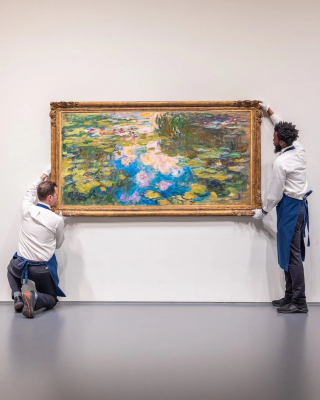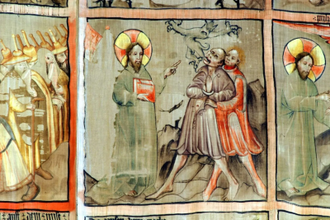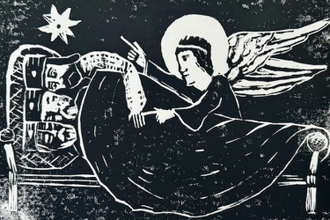Gospel in Art: A prophet is only despised in his own country

Le Bassin aux Nymphéas by Claude Monet (1840-1926), painted in 1917-19 © Sotheby's Paris, sold $70 million
Source: Christian Art
Gospel of 7 July 2024
Mark 6:1-6
Jesus went to his home town and his disciples accompanied him. With the coming of the sabbath he began teaching in the synagogue and most of them were astonished when they heard him. They said, 'Where did the man get all this? What is this wisdom that has been granted him, and these miracles that are worked through him? This is the carpenter, surely, the son of Mary, the brother of James and Joset and Jude and Simon? His sisters, too, are they not here with us?' And they would not accept him. And Jesus said to them, 'A prophet is only despised in his own country, among his own relations and in his own house'; and he could work no miracle there, though he cured a few sick people by laying his hands on them. He was amazed at their lack of faith.
Reflection on the painting
In today's Gospel, Jesus prepares his disciples for the inevitability of rejection. Rejection is an integral part of our lives, manifesting in various forms: not getting the desired job, losing friends over trivial matters, falling out with colleagues, or being excluded from events. We have all faced moments of rejection that have caused some form of suffering. In today's reading, Jesus experiences rejection in his own country, among his own people. Jesus experienced the same rejections as we do. He was rejected in his hometown; he was further rejected by Judas and by Peter, who three times denied knowing him, and felt forsaken by his Father on the cross, crying out, "My God, my God, why have you forsaken me?" Jesus understands our pain when we are rejected.
Throughout art history, many artists have also felt the sting of rejection. Pablo Picasso, Cézanne, Van Gogh, and Andy Warhol faced initial rejections. Entire movements, like Impressionism, were initially dismissed. The term 'Impressionism' itself arose from sarcastic criticism, mocking the new style of painting as mere 'impressions' rather than true art. Claude Monet, a leader of the movement, struggled for acceptance for many years. For the first two decades of his career, he found it difficult to sell any paintings. However, rejection served a good purpose for Monet, making him stronger, more focused, and more determined in his artistic pursuits. Rejection ultimately helped him grow as an artist.
Our painting by Claude Monet sold at Sotheby's New York for $70 million. It thus exemplifies this journey from rejection to acclaim. This series of water lilies holds a significant place in art history, as it marks the transition from Impressionism to the realm of abstraction and modern painting. Observe how abstract the flowers and leaves already are. Monet's struggle with rejection led to his eventual success and recognition, mirroring how our own experiences of rejection can lead to growth and resilience.
LINKS
Gospel in Art: https://christian.art/
Today's Reflection: https://christian.art/daily-gospel-reading/mark-6-1-6-2024-2/


















